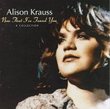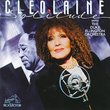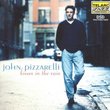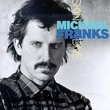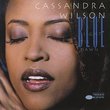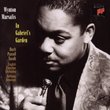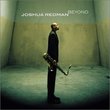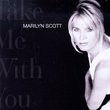| All Artists: Al Di Meola World Sinfonia Title: The Grande Passion Members Wishing: 0 Total Copies: 0 Label: Telarc Original Release Date: 10/24/2000 Release Date: 10/24/2000 Genres: International Music, Jazz, Pop, Rock, Metal Styles: Latin Music, Tango, Jazz Fusion, Rock Guitarists Number of Discs: 1 SwapaCD Credits: 1 UPC: 089408348129 |
Search - Al Di Meola World Sinfonia :: The Grande Passion
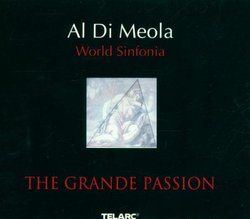 | Al Di Meola World Sinfonia The Grande Passion Genres: International Music, Jazz, Pop, Rock, Metal
Fusion firebrand Al Di Meola continues his passion of the 1990s, compositions written and inspired by Astor Piazzolla. What's remarkable is how strong Di Meola's own music sounds next to those of the late Brazilian tango a... more » |
Larger Image |
CD DetailsSynopsis
Amazon.com Fusion firebrand Al Di Meola continues his passion of the 1990s, compositions written and inspired by Astor Piazzolla. What's remarkable is how strong Di Meola's own music sounds next to those of the late Brazilian tango avatar. "Misterio" opens the album and sets the tone with a lush, romantic setting for acoustic guitar interpolated with colorful accents of sitar and winds, triggered by Di Meola's MIDI-guitar. It's a dynamic piece that takes unusual twists, and it sits comfortably next to Piazzolla's "Double Concerto," which follows. Again, using his strangely uncredited MIDI-guitar, Di Meola emulates Piazzolla's inimitable bandoneon sound. The guitarist has assembled a phenomenal group, including bassist John Patitucci, percussionists Gumbi Ortiz and Arto Tuncboyacian, pianist Mario Parmisano, and second guitarist Hernan Romero. With the virtuosity of his playing, Di Meola is often overlooked as a composer, and The Grande Passion underscores what a fine composer he is. String arrangements color "Double Concerto," the title track, and several other pieces, but Di Meola hardly needs orchestral frills to legitimize his already epic compositions. The guitarist has slipped from critical prominence since the days of Return to Forever, Splendido Hotel and the guitar trio with John McLaughlin and Paco De Lucia (try out Friday Night in San Francisco for a great trio outing), but Di Meola spent the 1990s doing some of his best work with his World Sinfonia group and The Grande Passion starts the new millennium in fine form. --John Diliberto Similarly Requested CDs
|
CD ReviewsConsistently Soporific Kurt Harding | Boerne TX | 12/12/2000 (3 out of 5 stars) "As a long time DiMeola fan and as one who particularly likes his world music project World Sinfonia I have to say that the Grande Passion is a little bit of a letdown. Yes, I've read all the reviews and the praise for its consistent quality. The problem I find is that it is consistently soporific. A DiMeola album is hard to review, the music is so complex. Before reviewing this, I listened at least a dozen times in different situations and moods yet reached the same verdict each time. The music is enjoyable and technically nonpareil, but it lacks the passion promised in the title. Libertango is the only cut with any musical vigor. Soledad, one of my favorite Piazzolla compositions, does not come to life here. I'm not saying that this is a dud like Scenario and Kiss My Axe were, I'm saying that the music lacks soul. If you like Al DiMeola no matter what, you are bound to like this but if you were expecting some of the spirit and energy of the first World Sinfonia CD, you are bound to be disappointed. Even the vaunted presence of a few Piazzolla classics cannot boost this to a five star rating." The most essential Di Meola album of the last 15 years Owen McGee | Dublin, Ireland | 07/30/2001 (5 out of 5 stars) "After dabbling in a lot of different musical styles in the last 15 years, some accused Al Di Meola of having lost his direction. However Al has really found his feet in the last couple of years by focusing his compositions upon his most central ability: to express himself on an acoustic guitar. As an acoustic guitarist, Al has always played with something like a flamenco or even classical guitarist's flair and one suspects that its his acoustic guitar music which will stand the test of time best. Since 1990 he has also focused upon tango guitar music and drawn a good deal of inspiration from Astor Piazzolla's music. Owing to the greater maturity of his compositions (and the sympathetic orchestral backing), this record captures Di Meola, the acoustic guitarist, at his best. The Grande Passion, featuring a small orchestra and contemporary jazz band, is important because (like what the album 'Secret Story' did for Pat Metheny) it seems to encapsulates the whole spirit of Al's musical career up to now into a symphonic whole. Though heavily produced, this album (unlike Metheny's) never sounds contrived. The music is indeed spirited and passionate and draws (genuinely) upon Latin musical styles, or more exactly Italian, Argentinian and even Cuban styles. The balance between electric and acoustic instruments (including the orchestra) on this record is perfect; a novel achievement. Although synthesisers are used, the total emphasis upon acoustic guitar, piano, percussion and orchestra on all the tracks means the music has an organic quality about it. In addition, the orchestra is not just there for 'dressing': all the instruments in and outside the orchestra play a role in the compositions. This makes the music very vital or 'natural' sounding. The emphasis in a lot of contemporary jazz and pop music is upon SOUNDS, producing records with a lot of samples or guest 'world-music' artists that play one or two notes; the overall effect being a fusion of sounds with no real artistic merit. This album is the opposite of that trend, and notwithstanding the heavy emphasis upon percussion, this album could impress a fan of classical orchestra music with its depths of expression. Di Meola's compositions do indeed stand up well beside the three Piazzolla compositions on this album; particularly the title track which reaches such heights of expression, I feel this track ought someday to become part of the classical guitarist's repetoire (already Manuel Barrueco has recorded it). Di Meola became well known for his loud electric guitar playing from 1975-83. Some would say he has changed a lot since then, but have a listen to some of his earliest acoustic tracks like 'Lady of Rome', 'Mediterranean Sundance', 'Fantasia Suite', 'Two to Tango' and 'Scenario' and you will see that though there was less harmony to the music back then, the spirit of his music has not really changed that much at all. As a fan of DiMeola, this album is important to me in that it has made me realise this. One last thing: The other two World Sinfonia records had a folk feel to them, often with two strumming guitars, accordion and nothing else, with Saluzzi on accordion taking a leading role in the music: this album is more of a Di Meola album (or a group album). For that reason, those Di Meola fans who didn't care for the other World Sinfonia albums should not allow themselves to be put off this one, which is far more characteristic of Al Di." Astor Piazzolla would be proud- Rick Banales | Los Angeles, CA | 10/25/2000 (5 out of 5 stars) "The sound and musical direction of Al DiMeola has changed drastically over the last thirty (THIRTY!!) years. The fusion speed-demon that burst on the scene with Chick Corea has given way to the mature, passionate artist that has created this beautiful album. The music he has created with his World Sinfonia group has to be one of the best examples of how an artist can be positively influenced by being open to everything the world has to offer. In Mr. DiMeola's case, it seems that the music of Astor Piazzolla has been a major catalyst for the dark, mysterious, smoldering music of World Sinfonia. The combination of DiMeola's guitar, the beautiful piano of Mario Parmisano, and the sensuous orchestral arrangements make for a great sound-think of the Gipsy Kings with much more musicality.I would suggest any of the World Sinfonia albums to those with "big ears" and a taste for the exotic and soulful-"The Grande Passion" is a wonderful place to start the journey."
|

 Track Listings (9) - Disc #1
Track Listings (9) - Disc #1